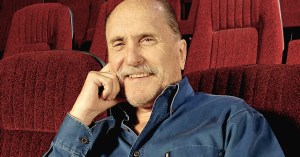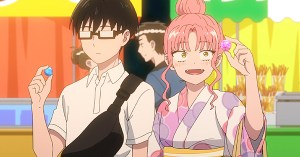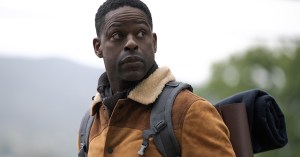RT Talks With Hannah Takes the Stairs‘ Joe Swanberg
The DIY maestro talks microbudget flicks, Mumblecore, and Larry David.
Joe Swanberg is a busy man. Since 2005, he’s
completed three films (Kissing on the Mouth,
LOL, and
Hannah Takes the Stairs),
is finishing up his fourth, has helmed two seasons of a web series (Young
American Bodies), has acted in several films, shot the making-of doc for Cabin
Fever 2, and held down several day jobs.
His latest,
Hannah Takes the Stairs, is a dramedy about a young woman who drifts
in and out of relationships over the course of a summer. The 25-year-old
Swanberg is one of the poster children for the emerging "Mumblecore" movement
that includes
Andrew Bujalski (Mutual
Appreciation,
Funny Ha Ha),
Jay and Mark Duplass (The
Puffy Chair),
Aaron Katz (Quiet City), and Ry Russo-Young (Orphans). The group is sort of a cinematic
Native Tongues: they frequently help with each other’s films (Swanberg appeared
in Quiet City; Bujalski, Russo-Young and Duplass all act in Hannah) and share a
no-budget, minimalist aesthetic that wittily and unsparingly looks at the social
lives of twentysomethings.
Hannah Takes the Stairs opens Aug. 22 in New York, but will be available
on-demand to Comcast and Cablevision subscribers the same day. RT talked
to Swanberg about his peers, the trials of shooting improvised films on tiny
budgets, and the genius of
Larry David and
Adam Sandler.
Rotten Tomatoes: Call it "Mumblecore" or whatever, but it seems like there’s a
large group of people that are doing something similar: movies about post-collegiates
and their romantic lives in naturalistic settings. So, you meet these other
directors and actors at festivals and you end up collaborating?
Joe Swanberg: Yeah, pretty much everyone I’ve met at festivals. That’s the
really cool thing about being able to take your movie around and show it. It
puts you in direct contact with people who are like-minded and interested in
similar things. I think the film festival circuit has certainly helped to foster
the community. And we’re living in a time where it’s really easy to keep in
touch with people via email, cell phones and that kinda stuff. It’s great. You
meet people in a setting where it’s really conducive to hanging out and having
fun. Most film festivals are really low-stress, and good times to hang out with
buddies and talk about what you’re working on and come up with new ideas.

Joe Swanberg.
RT: You’ve got a bunch of filmmakers acting in this movie. Given the fact that
everyone lives in different cities, how do your movies come together?
JS: With Hannah I think I got lucky. Mark Duplass came, like, literally a week
before he was gonna get married, and he came out to Chicago to act in the movie.
Andrew [Bujalski] just happened to have a little window of, like, nine or 10
days that he could come out. Ry [Russo-Young] was finishing the cut of her
movie, so she was at a point where she had a little bit of time. [Hannah] I got
lucky on. But with the other movies, I plan the shoots around when people are
available, and they usually take a really long time. With LOL, I ended up
spending eight months on it, because I could only shoot when people were around
and didn’t have other things. If you want to get certain actors in your movie,
you just have to be kind of flexible about their schedules.
RT: How much did Hannah Takes the Stairs cost?
JS: I don’t think I’m allowed to say, actually. I think the answer I’m allowed
to give is five figures.
RT: In other words, a little more than LOL.
JS: Yeah, way more than LOL. That’s something I can definitely say. Kissing on
the Mouth only cost about $2,000 and LOL only cost about $3,000, and
Hannah cost
way more than that. It felt like a really big budget to me, even though, in
fact, it’s not that big.
RT: What did that money do for you?
JS: It allowed me to be a full-time filmmaker for a couple months and not have
to have a day job and be balancing a bunch of other stuff. It allowed me to
bring in all these people from different parts of the country. It allows me to
have an actual food budget, where we could eat healthy for the month we were
shooting. It makes all the difference in the world.

Andrew Bujalski and Greta Gerwig.
RT: Many of the people in your cast are also filmmakers. What do you guys share
aesthetically and intellectually, and where do you differ?
JS: Todd [Rohal directed]
The Guatemalan Handshake. He’s got pretty different
sensibilities. Todd’s just an awesome dude. I wanted him because I think he’s
hilarious and I though he could be a great actor. With Andrew and Mark, we
approach a lot of things with similar mindsets. We’re looking for a certain kind
of realism or naturalism, and we go about it in different ways, but I think
we’re all striving for the same end result, which is to capture the patterns of
conversations and how people interact in a very realistic way. There are
different levels of scripting that we all use; I think I’m the most improvised
of the three, and probably Andrew’s the most written. But all of that is in
pursuit of similar things, and I think that we kind of recognize that in each
other.
then stop it if it isn’t working?
JS: My directing is really weird. Everything is based on whether it’s working or
not. I don’t try to fix something if it’s not working, I’ll just change it. A
lot of the people I’m working with are not actors, or it’s their first time in a
movie. I’m not trying to shape performances, coax performances out of them. It’s
more like I want to put them in situations that naturally work or allow them to
be themselves. If it’s not happening, I’ll just completely switch it up, rather
than trying to make it work.
RT: Obviously, someone like
John Cassavetes comes to mind, but who are other
influences on what you guys do?
JS: For me, I get a lot of influence from Larry David, with Seinfeld and
Curb
Your Enthusiasm, and Ricky Gervais with The Office, you know, that kind of
improvised comedy that’s deriving the humor from these awkward interactions and
situations. I really have fun going off the script and seeing what happens when
you put the actors in an awkward situation and force them to be their
characters. Also,
Werner Herzog‘s a big inspiration for me, not necessarily
because of his movies, but more because of his persona. And I like his writing
on film. I like what he has to say about the aesthetic truth, the methods he
employs to make these crazy movies happen. That kind of stuff’s really cool to
me.

Ry Russo-Young and Greta Gerwig.
RT: You have gotten a pretty good response on the festival circuit, particularly
at South by Southwest. Do you think about breaking out to a larger audience? Do
you think that’s possible?
JS: I don’t know. I’ve sort of made my peace with it. Hannah Takes the Stairs,
more than any of my other films, does have a chance to appeal to a wider
audience, but I don’t think it’s
Superbad. I do think there’s a smaller audience
that’s looking for something that’s a little more adult and a little more
nuanced [than many Hollywood movies]. At the same time, I think everyone who’s
making movies hopes to appeal to the widest audience possible. I want to
communicate with people, and I want to make something that works, and that
people like. I’m never purposefully trying to be antagonistic or shocking or
anything that would push an audience away. I’m always hoping to reach as many
people as I can.
RT: What would be your ideal situation in terms of funding or actors?
JS: I do like the idea of doing something different, maybe doing something
that’s more like a genre film. And there are certain actors that I’d like to
work with that would go along with working with a bigger budget. I think Adam
Sandler’s amazing, and I would love to do a movie with him. In order to make
that work, it would have to be something that’s more structured.
Samantha
Morton‘s great. I mean, there are people I’m drawn to that you just can’t do a
tiny, no-budget movie with. I would like to pursue some of that stuff, to see if
I could do a movie with some of those people. And I don’t really write scripts
myself, but if I read a script I thought was really great, I would totally be up
for doing a more traditional movie. It’s just that I don’t exist in that world
right now. I don’t have an agent. I don’t take meetings or anything like that,
so I don’t really know what’s out there. I’m not closed off to anything, but I’d
just have to ask myself at every step if it’s worth it. Am I doing the movie
because I’m really excited about it and want to do it, or am I doing it because
it seems like it’s a big budget or something like that? It would still have to
be the right thing, because my lifestyle’s really cheap and I’m able to exist
doing smaller movies, so if I’m able to do that, I’m happy to do that. But if
something bigger came along that seems really cool, then that would be great.
RT: What’s your day job?
JS: It’s a lot of different things. I do some freelance web design stuff. I
taught a directing class for this not-for-profit organization here in Chicago a
couple months ago. I wrote a thing for Filmmaker Magazine a couple months ago.
Occasionally, I’ll get to go speak to students at a university and make a little
money that way, which is great. I really like doing that.

Mark Duplass and Greta Gerwig.
RT: So what would you tell someone about your film? Why should they see it? And
where can they see it?
JS: I’m really proud of all the actors. Whether the storyline or the improvised
format appeals to people, I think the performances are all really strong. For
people who want to see acting at its finest, they should check it out for that.
Greta [Gerwig] worked really hard on her character. Hopefully it’s a really
accurate, interesting woman character, which we don’t see enough of. Oh, and it
will be on-demand too. If people don’t live in New York City, they can still
watch it the same day it opens. Everybody with [Cablevision] and Comcast can see
it the same day it comes opens. [IFC] is doing that with all of their First Take
[Movies]. All of those movies are day and date theatrical and on-demand.
RT: What’s next for you?
JS: A couple things. I’m editing a new feature called Nights and Weekends that I
shot back in December. I did that with Greta Gerwig and she’s
also in the first season of Young American Bodies, a web show that I do. She’s
been in a lot of my stuff. She and I act [in Nights and Weekends], playing a
long distance couple. I’m also about to start on a new web series called Butterknife. It’s about a private eye. By day, he deals with the ugly side of
relationships, and catches spouses cheating on each other and stuff like that.
But then, by night, he’s got this really cute, sweet relationship back at home
with his wife. I actually just got home from London last week, because I was
acting in a movie out there. Just after South by Southwest I went down to North
Carolina, because I shot the behind-the-scenes documentary for Cabin Fever 2, so
I’m still editing that. Yeah, it’s crazy. I’ve always got five or six things
going at once.






